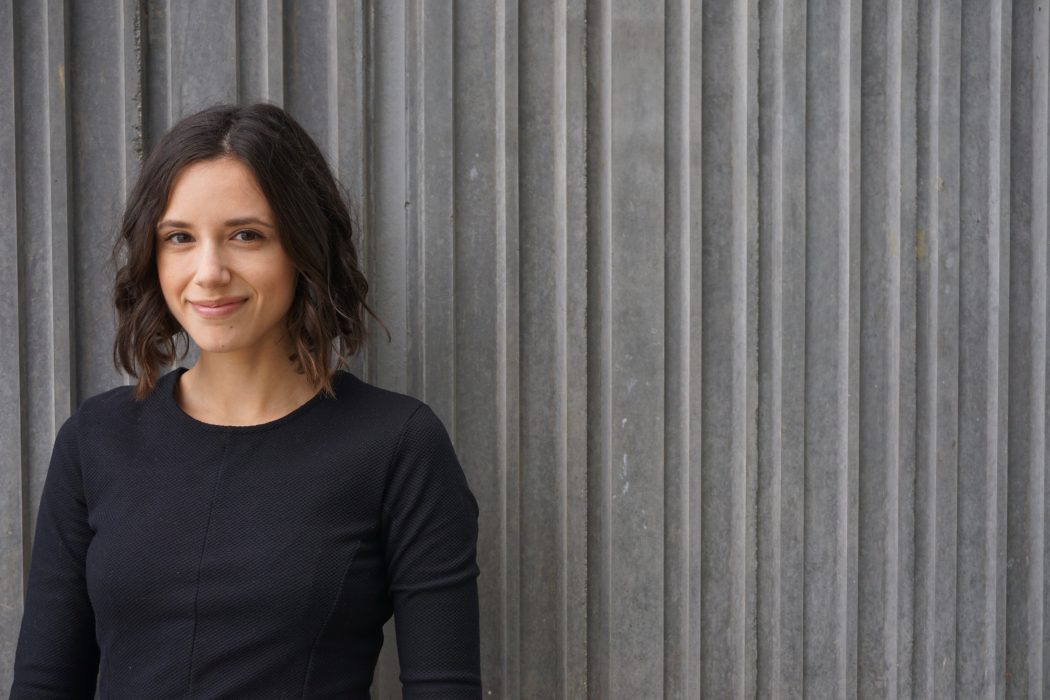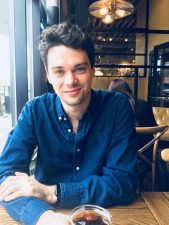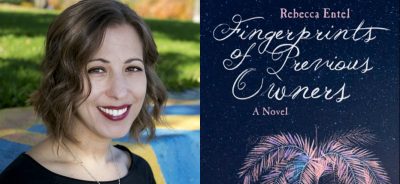Catapult Books
A Conversation With PEN America Best Debut Short Stories 2018 Author Cristina Fríes
“I thought this exemplified two aspects of the Colombian spirit that interest and delight me: Any festive occasion can become an excuse to start a full-on party; and time is, as a manner of speaking, subjective.”
On August 21, Catapult published PEN America Best Debut Short Stories 2018 , the second edition of an anthology celebrating outstanding new fiction writers published by literary magazines around the world. In the upcoming weeks, we’ll feature Q&As with the contributors, whose stories were selected for PEN’s Robert J. Dau Short Story Prize for Emerging Writers and for the anthology by judges Jodi Angel, Lesley Nneka Arimah, and Alexandra Kleeman. “New Years in La Calera” is told from the perspective of a girl living with her grandparents in a remote valley in the Andes while guerrilla soldiers and escaped hostages pass right outside the door.
*
Cristina Fríes is an MA student in creative writing at the University of California, Davis. Many of her stories explore ways in which women and girls contend with displacement and placelessness, disorientation, and trauma. Traveler and nomad at heart, she splits her time writing in California and Latin America. She is currently at work on a collection of stories and an opera. More at cristinafries.com .
*
New Years, we believe, was four days ago, but the party down the hill has not stopped since then. Those who walk through our hills—the drug traffickers, the guerrilla, the runaways—pause to listen to the boleros echoing against the valley walls, and know this place must be some kind of refuge. Without owning calendars but instead sensing the time of year through their memories or by watching the movement of the stars, they can tell it’s close to the first day of the new year. From the big house down the hill, the drum rhythms beat their way through the tall stalks of the tree ferns, inviting them to celebrate. I can even hear the party from our home when I’ve been bad and have to spend the night in the basement with the butterflies, blowing them off my nose with my sleeping, slow breath.
While some people who pass by our home will be dressed in muddy jeans, holding the hands of children who wear the faded clothes of their older siblings, others will be in green army suits with their pants tucked loosely into their boots. This migration, I’ve learned, is evidence of the warfare occurring in the rest of the country. Here, on the hill where we have always lived, we are not involved. I watch the people pass by us like streams while we stay put, stubborn as rocks. My grandparents have lived in this house since they became the groundskeepers, so many years ago they can’t remember when they first arrived, unsure if it was when they were children or married adults, if the dogs were theirs or if they belonged to the farm, if there was war or peace.
*
Catapult: Where did you find the idea for this story?
Cristina Fríes: The story takes place on my grandfather’s finca a couple hours outside of Bogotá, Colombia. It’s not what you expect when you hear the word “farm.” Really, it’s more an old house on a plot of land in the middle of the Andes, hilly and dense with what always looked to me like a prehistoric forest. It’s a very isolated place, and my family has been going there to get away from the city since the 1970s. I would go there every year growing up, too, and on our hikes through the hills, my grandfather would tell my sister and me to look for the elves that lived beneath the bright blue mushrooms. As a child, this place was mysterious and imbued with magic, a feeling that persists for me to this day.
In the late 1990s and early 2000s, however, we were not able to leave Bogotá and drive to la finca because the FARC and the paramilitaries set up roadblocks on the roads that led to it. The guerrilla kidnapped ordinary civilians at these roadblocks, a strategy used to terrorize the country in their fight to gain political power. This was during the peak of the civil war between guerrilla extremist groups and the government.
Around that time, we kept receiving phone calls from the caretakers of la finca. They told us people were breaking into my grandfather’s house and stealing things: pots and pans, silverware, dishes, blankets, pillows. In my story, it’s the abusive grandfather character who steals from “the big house down the hill,” though in real life they were most likely common thieves. Then one day, a tragedy occurred on the farm. The caretaker and his teenaged son were both shot, and the son was killed. We don’t know who the shooter was. But as a young girl, these stories about la finca and the guerrilla would get muddled in my mind—was it a common thief who shot the caretaker’s son, or a guerrilla soldier? And what would happen if we went back to la finca? Would I get kidnapped?
So, the idea for this story emerged from that place, and the feelings associated with it: chaos, uncertainty, fear of violence; its magic, beauty, isolation, and inaccessibility. It seemed for years as though la finca were cut off from the universe it had belonged to in my childhood, and suddenly there were terrible things happening there and all over the country that I could barely understand at that age. In my story, I wanted to explore what it might be like for a girl with very few resources be trapped in the thick of it.
Butterflies are everywhere in this story. What do they mean to the narrator and what did they mean to you while you were writing this story?
The butterflies came from a true story. Once, my grandpa hypnotized my mother’s friend who had a phobia of butterflies. Under hypnosis, she revealed a repressed memory about being punished as a child by being locked in a closet filled with butterflies and moths. I found this story haunting, and it stuck with me for years. I have always been interested in discovering the origin of people’s unintuitive behavior—this, to me, is an essential part of why I write. Uncommon phobias in particular captivated my curiosity when I wrote this story—how does a person come to be terrified of something as benign as a peach, beards, or mustard?
In my story, the grandfather punishes the narrator for her wild behavior by locking her in a basement filled with butterflies. Naturally, she hates them. At the same time, she begins to see guerrilla soldiers not as murderers and criminals, but as princes draped in golden ammunition. To the narrator, the guerrilla soldiers represent freedom and adventure—everything that she is missing by living on the isolated finca where her grandparents fail to take care of her. The narrator’s sense of fear, of right and wrong, of illusion versus reality, have all been inverted. The butterflies play a role in that inversion.
Can you speak about the significance of having this story take place at the start of the New Year?
New Years plays an important role in my story because of another true story. My great-uncle used to be a sort of jungle cowboy, as I understood it. As a young man, he would ride his horse through the Colombian jungles and stay the night in whatever village he’d come across along the way. During one of these journeys, he arrived at a village on New Years Eve. He stayed, partied, and set off the following day. In the next village, the people there were also celebrating New Years Eve. And he encountered the same scene in the next village the following day. Nobody in any of these villages knew what day it was, cut off as they were from civilization. To think that “today is more or less New Years” was a good enough reason for them to celebrate it.
I thought this exemplified two aspects of the Colombian spirit that interest and delight me: Any festive occasion can become an excuse to start a full-on party; and time is, as a manner of speaking, subjective.
In my story, there’s a New Years celebration that goes on for several days. New Years is a holiday that is supposed to make you feel like you’re about to embark on a new chapter, a feeling that is dictated by the how we keep time. I thought about how people who are imprisoned in movies often tell time through tallies marked on the wall, not by calendar days or months. This is sort of how the narrator keeps track of time when she is alone in the dark basement: not tallies, but through feelings and intuition. And when she is let out of the basement, all bets are off—anything that she does could cause her to be thrown back in. To start a new chapter, a new beginning: What does this sort of hope even mean when the future points to more danger, more chaos? When everything is so uncertain and not even time can orient you, what stories do you tell yourself just to manage? I imagined the characters senselessly prolonging this celebration as a way to keep the future, and the threats that come with it, at bay. It’s a delusion and a way to survive.
How long did it take you to write this story?
I wrote the first draft in a day or two. I remember I stayed up until sunrise finishing it. This was in 2013. After the first draft was workshopped in my undergraduate fiction class, I began revising it. That took much longer. This revision process continued in day- or week-long sessions every few months or so for about three or four years.
H ow has the Robert J. Dau Prize affected you?
The immediate effect was pure disbelief. Shaky hands and legs. I was very happy. My writing process has always had its highs and lows, my inner self-critic casting shade and doubt. The prize, when it came, helped that smaller voice of encouragement grow louder. It gave me a wave of energy that has been carrying me through while I work on my collection of short stories. I’ve been perhaps more than ever determined to finish my book.
What are you working on now?
I’m working on a collection of short stories. I just finished a draft of a story about a young woman working on a strange farm where other girls have landed themselves to seek refuge from abusive relationships. I hope to finish the collection, which includes “New Years in La Calera,” by next year. I am also writing the libretto of an opera. The story is a re-imagined telling of the fairy tale “Donkey Skin.” A shorter version of the opera was already performed in May, and now my collaborator and I plan on having a new, expanded version performed Fall 2019 in Northern California.
Finally, where do you discover new writing?
Most often through friends, Googling, and recommendations from professors. I follow writers and literary magazines on social media and try to stay abreast of what they are reading and publishing. Sometimes after buying a book on Amazon, the “suggested” books are surprisingly apt. Amazing algorithms. I am traveling in Latin America now, and the bookstores here are great. The discovery process is always evolving.








